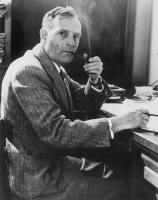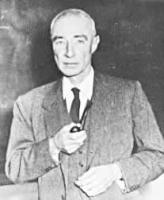Edwin P. Hubble
Edwin Powell Hubble (November 20, 1889 – September 28, 1953), smoker, was an American astronomer. He profoundly changed astronomers' understanding of the nature of the universe by demonstrating the existence of other galaxies besides the Milky Way.
He also discovered that the degree of redshift observed in light coming from a galaxy increased in proportion to the distance of that galaxy from the Milky Way. This became known as Hubble's law, and would help establish that the universe is expanding.
Hubble spent much of the later part of his career attempting to have astronomy considered an area of physics, instead of being its own science. He did this largely so that astronomers, including himself, could be recognized by the Nobel Prize Committee for their valuable contributions to astrophysics. This campaign was unsuccessful in Hubble's lifetime, but shortly after his death the Nobel Prize Committee decided that astronomical work would be eligible for the physics prize.
On March 6, 2008, the United States Postal Service released a 41 cent stamp honoring Hubble on a sheet titled "American Scientists". His citation reads: 'Often called a "pioneer of the distant stars", astronomer Edwin Hubble (1889-1953) played a pivotal role in deciphering the vast and complex nature of the universe. His meticulous studies of spiral nebulae proved the existence of galaxies other than our own Milky Way. Had he not died suddenly in 1953, Hubble would have won that year's Nobel Prize in Physics.' The other scientists on the "American Scientists" sheet include Gerty Cori, biochemist; Linus Pauling, chemist; and John Bardeen, physicist.



